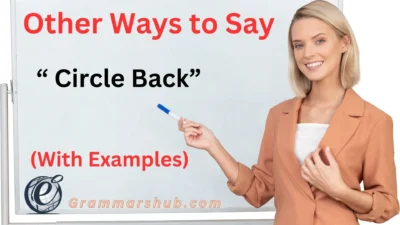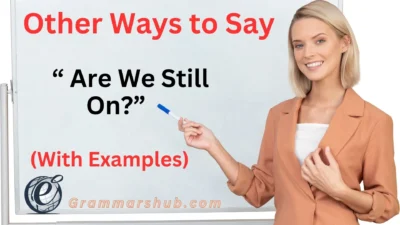Finding the right words to communicate with warmth, care, and thoughtfulness is essential, especially in sensitive or professional situations. The phrase “kindly request” is polite, but sometimes it might feel too formal or impersonal. Luckily, there are many alternative ways to express the same sentiment in ways that resonate with empathy and consideration.
In this article, we’ll explore 35 thoughtful ways to say “kindly request,” offering examples and explanations to help you communicate in a more meaningful and personalized way.
What Does “Kindly Request” Mean?
Before diving into the alternatives, let’s quickly define what we mean by “kindly request.” The phrase “kindly request” is a polite way to ask someone for something. It expresses consideration and respect while maintaining a formal or courteous tone. Whether you’re asking for a favor, making an inquiry, or seeking assistance, using this phrase helps convey that you are asking in a considerate manner.
Is It Professional/Polite to Say “Kindly Request”?
Yes, “kindly request” is generally considered professional and polite. It’s often used in formal correspondence, such as business emails, letters, or official documents. However, in less formal or casual settings, it may come across as a bit too stiff or distant. Finding the right balance between politeness and approachability can make all the difference in how your message is received.
Advantages or Disadvantages of Using “Kindly Request”
Advantages:
- Respectful and Polite: Using “kindly request” ensures that your request sounds courteous.
- Clear and Direct: The phrase gets straight to the point without beating around the bush.
- Versatile: It works in both formal and semi-formal settings.
Disadvantages:
- Overused: Sometimes, it can sound a bit robotic or formulaic, especially in casual conversations.
- Can Feel Distant: While polite, it may create a sense of distance between you and the recipient, making the request less personal.
1. Humbly Ask
Meaning: To make a request with humility and respect.
Detailed Explanation: Using the word “humbly” shows that you acknowledge the other person’s position or authority while expressing your request. It can also convey a sense of gratitude.
Scenario Example: “I humbly ask for your feedback on my proposal.”
Best Use: In professional emails or conversations where you’re seeking advice or permission from a higher authority.
Tone: Respectful, humble, and grateful.
2. Would Appreciate It if
Meaning: A polite way of expressing a request while acknowledging that it is a favor.
Detailed Explanation: By saying “would appreciate it,” you’re giving the other person the freedom to decide while emphasizing that their help would be valued.
Scenario Example: “I would appreciate it if you could send me the report by Friday.”
Best Use: In professional or casual settings when you want to express that you value someone’s time.
Tone: Appreciative, warm, and respectful.
3. I’d Be Grateful if
Meaning: A courteous expression of gratitude in advance.
Detailed Explanation: This phrase is similar to “would appreciate it,” but it slightly emphasizes gratitude in advance for a favor being done.
Scenario Example: “I’d be grateful if you could take a look at my presentation.”
Best Use: When requesting something that requires time or effort from the other person.
Tone: Grateful, polite, and considerate.
4. May I Kindly Ask
Meaning: A formal and polite way to ask for something.
Detailed Explanation: The word “may” implies permission, making the request sound even more respectful and courteous.
Scenario Example: “May I kindly ask for an extension on the deadline?”
Best Use: In formal emails or when asking for permission in a professional environment.
Tone: Polite, formal, and respectful.
5. Would You Mind
Meaning: A softer way to make a request, asking if something would be inconvenient.
Detailed Explanation: This phrase conveys politeness by considering whether your request may impose on the other person.
Scenario Example: “Would you mind helping me with this task?”
Best Use: In casual settings or professional emails where you want to ensure that the request is not too burdensome.
Tone: Polite, considerate, and gentle.
6. Could You Please
Meaning: A polite, direct way to make a request.
Detailed Explanation: This alternative is a more approachable way of asking for something without sounding too formal or distant.
Scenario Example: “Could you please send me the updated document?”
Best Use: In both professional and casual settings.
Tone: Direct, polite, and friendly.
7. Would You Be So Kind
Meaning: A very formal way to request something, implying that the person would be doing you a favor.
Detailed Explanation: This phrase is highly polite and expresses that you are asking for something with great respect.
Scenario Example: “Would you be so kind as to send me the requested information?”
Best Use: In formal settings, especially when asking for a favor from someone you don’t know well.
Tone: Extremely polite, formal, and respectful.
8. I Would Be Delighted if
Meaning: A warm and enthusiastic way to express a request.
Detailed Explanation: By using “delighted,” you convey a positive, eager tone while making your request.
Scenario Example: “I would be delighted if you could join us for the event next week.”
Best Use: In friendly or semi-formal invitations or requests.
Tone: Warm, friendly, and polite.
9. I Would Love It If
Meaning: A casual, but polite way to make a request.
Detailed Explanation: This phrase implies that you would be pleased if the request is granted, but it remains casual enough for everyday conversation.
Scenario Example: “I would love it if you could come by and visit sometime soon.”
Best Use: In informal or semi-formal contexts when speaking to colleagues or friends.
Tone: Friendly, casual, and warm.
10. Would You Kindly
Meaning: A formal and respectful request.
Detailed Explanation: A polite phrase often used in professional settings, it requests something with a strong sense of respect.
Scenario Example: “Would you kindly provide me with the necessary details for this task?”
Best Use: In professional or formal requests.
Tone: Formal, respectful, and courteous.
11. It Would Be Great If
Meaning: A more casual way to request something while showing that the request would be appreciated.
Detailed Explanation: This phrase expresses appreciation in advance while sounding less formal than other alternatives.
Scenario Example: “It would be great if you could send over the report by tomorrow.”
Best Use: In professional or casual work settings.
Tone: Casual, polite, and appreciative.
12. I Would Appreciate Your Help
Meaning: A clear and direct way to ask for assistance, showing that you value the other person’s support.
Detailed Explanation: This alternative is particularly useful when you’re requesting help and want to convey gratitude.
Scenario Example: “I would appreciate your help in reviewing the document.”
Best Use: In professional or collaborative work environments.
Tone: Appreciative, respectful, and direct.
13. Could I Ask
Meaning: A polite way to ask for something while leaving room for the other person’s decision.
Detailed Explanation: This phrase softens the request, making it less demanding and more flexible.
Scenario Example: “Could I ask you to give me a hand with this project?”
Best Use: In both formal and informal settings where you want to ask without being pushy.
Tone: Respectful, polite, and considerate.
14. Please Be So Kind
Meaning: A formal request, often used in written communication.
Detailed Explanation: This alternative expresses politeness and requests something in a very respectful way.
Scenario Example: “Please be so kind as to confirm your availability for the meeting.”
Best Use: In formal, professional communication.
Tone: Formal, polite, and respectful.
15. I Would Appreciate It a Lot
Meaning: A more casual and enthusiastic way to express appreciation for a favor.
Detailed Explanation: This phrase conveys eagerness and gratitude, making it more personal and heartfelt.
Scenario Example: “I would appreciate it a lot if you could get back to me soon.”
Best Use: In casual conversations, especially when speaking with close colleagues or friends.
Tone: Warm, appreciative, and informal.
16. I Sincerely Ask
Meaning: A heartfelt and genuine way to make a request.
Detailed Explanation: The word “sincerely” adds a personal and warm touch to your request, showing that you genuinely need assistance.
Scenario Example: “I sincerely ask for your understanding regarding this delay.”
Best Use: In professional or personal situations where sincerity is crucial.
Tone: Warm, respectful, and heartfelt.
17. If You Could Kindly
Meaning: A softer way to make a request, emphasizing politeness.
Detailed Explanation: This phrase acknowledges the effort of the other person while making the request sound more considerate.
Scenario Example: “If you could kindly send me the required documents, I would appreciate it.”
Best Use: In business emails or formal requests.
Tone: Polite, professional, and appreciative.
18. I Am Reaching Out to Request
Meaning: A professional way to ask for something in written communication.
Detailed Explanation: This phrase is commonly used in emails and formal conversations to signal a request without being too direct.
Scenario Example: “I am reaching out to request an update on our project status.”
Best Use: In corporate emails and formal requests.
Tone: Professional, direct, and polite.
19. I Kindly Ask for Your Support
Meaning: A respectful way to ask for help or cooperation.
Detailed Explanation: This phrase is often used in professional settings where teamwork is needed.
Scenario Example: “I kindly ask for your support in resolving this issue as soon as possible.”
Best Use: When requesting cooperation in a team or business environment.
Tone: Respectful, professional, and encouraging.
20. Would You Consider
Meaning: A diplomatic and respectful way to make a request.
Detailed Explanation: Instead of demanding, this phrase allows the other person to reflect and decide.
Scenario Example: “Would you consider extending the deadline by a few days?”
Best Use: When negotiating or asking for flexibility.
Tone: Thoughtful, respectful, and professional.
21. I Hope It’s Not Too Much to Ask, but…
Meaning: A polite and considerate way to ask for something while acknowledging it might be inconvenient.
Detailed Explanation: This phrase softens the request, making it more personal and less demanding.
Scenario Example: “I hope it’s not too much to ask, but could you help me with this project?”
Best Use: When asking for favors in both professional and personal settings.
Tone: Warm, considerate, and apologetic.
22. It Would Mean a Lot If
Meaning: Expresses that fulfilling the request is personally important to you.
Detailed Explanation: This phrase adds a personal touch and emphasizes appreciation.
Scenario Example: “It would mean a lot if you could review my application before I submit it.”
Best Use: In personal and professional settings where emotions are involved.
Tone: Emotional, grateful, and sincere.
23. I’d Love Your Assistance With
Meaning: A friendly and appreciative way to ask for help.
Detailed Explanation: This phrase makes the request feel less like an obligation and more like an invitation.
Scenario Example: “I’d love your assistance with organizing the event.”
Best Use: In teamwork situations or when making casual work requests.
Tone: Warm, engaging, and appreciative.
24. If It’s Not Too Much Trouble
Meaning: A very polite way to make a request while considering the other person’s time.
Detailed Explanation: This phrase ensures that the request doesn’t seem like a burden.
Scenario Example: “If it’s not too much trouble, could you send me the updated files?”
Best Use: In formal and casual settings when making polite requests.
Tone: Courteous, humble, and respectful.
25. Whenever You Get a Chance
Meaning: A flexible and non-pressuring way to ask for something.
Detailed Explanation: This phrase allows the other person to respond when convenient.
Scenario Example: “Whenever you get a chance, could you review my document?”
Best Use: In workplace settings where the request is not urgent.
Tone: Relaxed, polite, and understanding.
26. I Would Be Extremely Grateful If
Meaning: Emphasizes gratitude and appreciation in advance.
Detailed Explanation: This phrase adds a stronger emotional weight to your request.
Scenario Example: “I would be extremely grateful if you could help me finalize this report.”
Best Use: In formal and heartfelt requests.
Tone: Warm, appreciative, and respectful.
27. At Your Earliest Convenience
Meaning: A professional way to request something while respecting the other person’s time.
Detailed Explanation: This phrase suggests urgency but without pressuring the recipient.
Scenario Example: “Please submit the report at your earliest convenience.”
Best Use: In professional emails or workplace communication.
Tone: Polite, flexible, and professional.
28. When You Have a Moment
Meaning: A softer, non-urgent way to make a request.
Detailed Explanation: This phrase respects the other person’s schedule while gently requesting their attention.
Scenario Example: “When you have a moment, could we discuss the upcoming meeting?”
Best Use: In informal or semi-formal settings.
Tone: Respectful, casual, and polite.
29. Could I Trouble You For
Meaning: A humble way to ask for something while acknowledging it may be an inconvenience.
Detailed Explanation: This phrase makes the request sound even more considerate and respectful.
Scenario Example: “Could I trouble you for a quick review of my work?”
Best Use: When asking for favors in professional or personal settings.
Tone: Humble, polite, and respectful.
30. If It’s Possible
Meaning: A gentle way to make a request without putting pressure on the other person.
Detailed Explanation: This phrase leaves room for flexibility, making it sound less demanding.
Scenario Example: “If it’s possible, could you send me the details today?”
Best Use: When requesting something in a non-urgent way.
Tone: Flexible, polite, and professional.
31. Would You Be Able To
Meaning: A polite way to ask if someone has the capability or availability to fulfill a request.
Detailed Explanation: This phrase subtly implies that the person has a choice and gives them room to decline if necessary, making it sound more considerate.
Scenario Example: “Would you be able to send me the updated report by this afternoon?”
Best Use: In professional emails or workplace communication when making a non-urgent request.
Tone: Polite, respectful, and considerate.
32. I Would Greatly Value
Meaning: Emphasizes appreciation and respect in advance of fulfilling a request.
Detailed Explanation: By using “greatly value,” you make the recipient feel that their help is important and respected.
Scenario Example: “I would greatly value your input on this proposal before we submit it.”
Best Use: When asking for feedback or assistance from someone whose opinion is important.
Tone: Appreciative, respectful, and formal.
33. If You Don’t Mind
Meaning: A gentle and casual way to ask for something while considering the other person’s comfort.
Detailed Explanation: This phrase helps soften the request and make it sound less demanding.
Scenario Example: “If you don’t mind, could you take a look at this for me?”
Best Use: In both professional and casual settings when you want to make your request feel more easygoing.
Tone: Considerate, friendly, and polite.
34. Is There Any Chance You Could
Meaning: A friendly and flexible way to make a request without putting pressure on the recipient.
Detailed Explanation: This phrase makes the request sound like a possibility rather than an obligation, making it easier for the other person to respond.
Scenario Example: “Is there any chance you could help me with this last-minute task?”
Best Use: When requesting help or assistance in an informal or semi-formal setting.
Tone: Friendly, warm, and considerate.
35. I Would Love to Hear Your Thoughts On
Meaning: A polite way to request feedback or an opinion.
Detailed Explanation: This phrase shows appreciation in advance while making the recipient feel valued and included.
Scenario Example: “I would love to hear your thoughts on this idea before we move forward.”
Best Use: In professional or collaborative environments when seeking feedback or input.
Tone: Warm, engaging, and appreciative.
Conclusion
Words matter, and how you make a request can shape how it is received. “Kindly request” is a great phrase, but sometimes, adding a touch of warmth, care, or flexibility makes your request more effective.
By using the alternatives in this list, you can tailor your requests to different situations—whether you’re sending a formal email, asking a friend for help, or negotiating in a professional setting.




